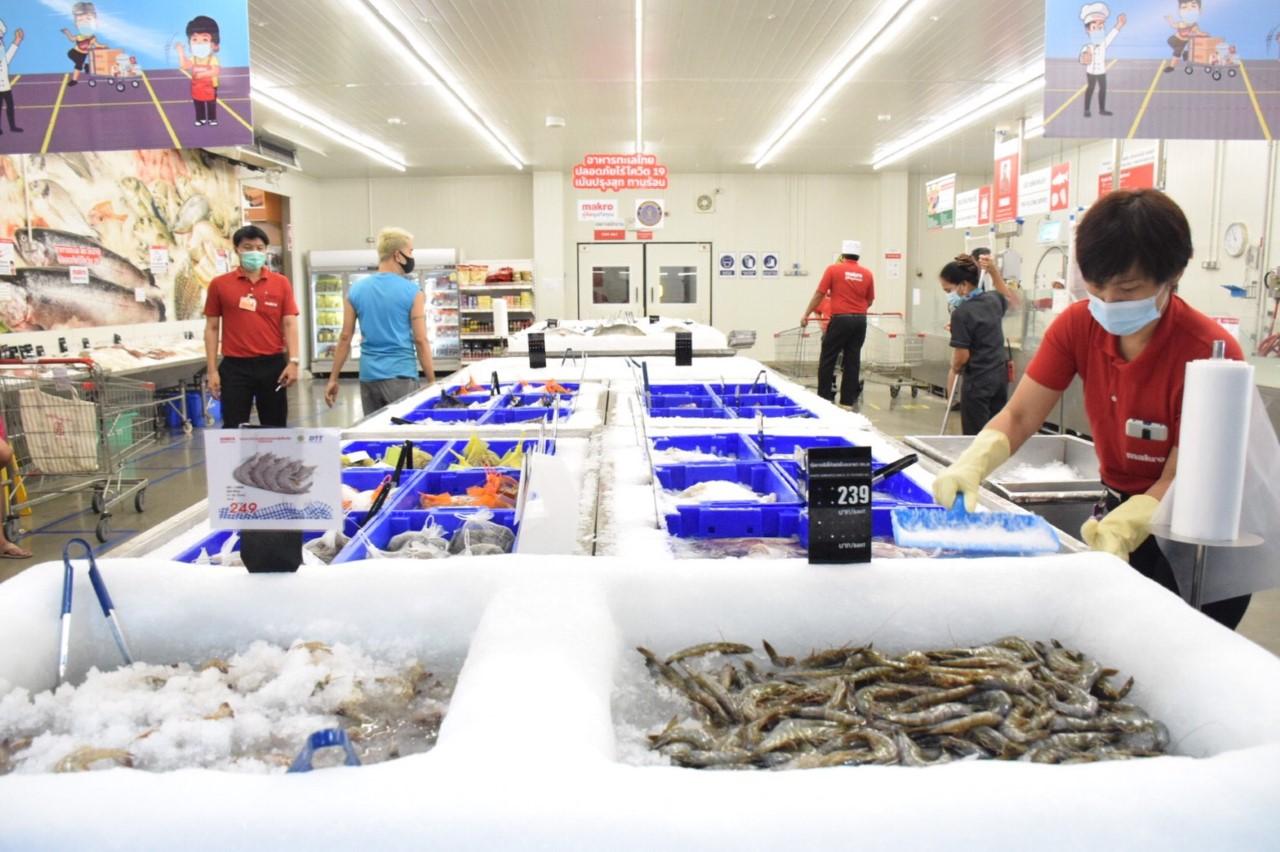The economic impact of Covid-19 on the world's most populous region is further undermining efforts to improve diets and nutrition of nearly 2 billion people who were already unable to afford healthy diets.
As many as 1.9 billion people in Asia and the Pacific were unable to afford a healthy diet, even before the Covid outbreak and the damage it caused to economies and individual livelihoods, research by United Nations agencies shows.
Supply chain disruptions have pushed up prices for many basic foods including fruits, vegetables and dairy products, making it even harder for poor people to achieve healthy diets.
Affordability is critical to ensure food security and nutrition for all -- and for mothers and children in particular, says a report entitled "Asia and the Pacific Regional Overview of Food Security and Nutrition 2020: Maternal and Child Diets at the Heart of Improving Nutrition".
"Food prices and available incomes govern household decisions on food and dietary intake. But the outbreak of Covid and a lack of decent work opportunities in many parts of the region, alongside significant uncertainty of food systems and markets, has led to a worsening of inequality, as poorer families with dwindling incomes further alter their diets to choose cheaper, less nutritious foods," says the report jointly published by the Food and Agriculture Organization (FAO), the UN Children's Fund, the World Food Programme and the World Health Organization (WHO).
According to the report, more than 350 million people in Asia Pacific were undernourished in 2019, representing roughly half of the global total. Across the region, an estimated 74.5 million children under 5 years of age were stunted, or too short for their age, and 31.5 million suffered from wasting, defined as being too thin for their height.
The majority of these children live in South Asia, where nearly 56 million are stunted and more than 25 million display signs of wasting. At the same time, overweight and obesity has increased rapidly, especially in Southeast Asia and the Pacific, with an estimated 14.5 million children under five, being overweight or obese.
"Poor diets and inadequate nutritional intake is an ongoing problem," the report says. "The cost of a healthy diet is significantly higher than that of a diet that provides sufficient calories but lacks nutritional value, showing significant gaps in the food system to deliver nutritious options to all at an affordable price. These costs are even greater for women and children, given their added nutritional needs."
Food accessibility has become a real concern in light of higher food prices and income reduction during the pandemic, according to Witsanu Attavanich, an associate professor of economics at Kasetsart University.
In Thailand, the prevalence of high food prices is more severe in the North than in other regions, mainly because the food marketing structure varies between different parts of the country.
Household debt, which has reached an all-time high of 86.7% of gross domestic product (GDP), affects the four pillars of food security: availability, access, utilisation, and stability of the first three pillars, said Dr Wissanu.
High food prices during the first and second waves of the coronavirus outbreak stemmed from declining volumes of food produced, increasing input prices and transport costs, and higher demand, partly because more people were cooking at home out of necessity.

FARM TO FORK
Dr Witsanu also believes that the second Covid wave that Thailand has been experiencing since mid-December, originating in the seafood hub of Samut Sakhon, would not have been so severe if the country had a more comprehensive food traceability system.
"Although there is no substantial evidence of Covid transmission via food, we can learn a lesson that traceability and food safety are crucial and have a strong impact on overall economic conditions in the time of the coronavirus crisis," he said.
He emphasised that active implementation of food traceability from farm to fork by various agencies will be beneficial for the country in the long run.
The economist reached his conclusions based on a study he conducted about the impact of Covid on Thailand's agricultural sector during the first outbreak in 2020. He recommended that the government do more to raise awareness of the importance of food safety, so that consumers will be willing to pay more for safe products.
Farmers are also encouraged to produce safer products and promote traceability so that consumers and food manufacturers can monitor food safety from farm to fork.
Dr Witsanu also recommends that small-scale farmers group together in cooperatives, which would help them achieve economies of scale and increase production and export volumes.
The government should also help smallholders access effective logistics at an affordable cost in order to reduce food loss and increase net farm income. The use of modern machinery and technology needs to be promoted to improve farm productivity.
As well, young farmers need to be encouraged to remain on the land. The average age of farmers is rising and many elderly farmers have no one in the family who wants to take over from them.
To meet consumer needs, the government should support production of healthy food, and promote more innovation and development for agricultural products. Data analytics should also be made available to smallholders, so that they can plan in advance what they should be planting for the coming season to meet real demand and avoid oversupply.

Improved food traceability might have lessened the impact of the second Covid wave that Thailand has been experiencing, says Witsanu Attavanich An economist at Kasetsart University SUPPLIED
AFFORDABLE & ACCESSIBLE
The UN report calls for a transformation of food systems, with an aim to increase the affordability of, and families' access to, nutritious, safe and sustainable diets.
To ensure that happens, it calls for integrated approaches and policies to overcome affordability constraints, and also to ensure healthy maternal and child diets.
"Investments in nutrition build human capital and boost shared prosperity. This is the future and all of us can contribute to it," said Emorn Udomkesmalee, senior adviser at the Institute of Nutrition at Mahidol University.
Education about what constitutes a healthy diet and how to create hygienic environments at home, in schools and in the community is essential. Also critical in many countries is investment in girls' education and in infrastructure to support good water, sanitation and hygiene (WASH) practices.
"Hygiene and sanitation has never been so much at the forefront. WASH systems are now bringing the new normal to Covid prevention," said Ms Emorn.
Nutrition is vitally important throughout a person's life. The impact of a poor diet is most severe in the first 1,000 days, from pregnancy to when a child reaches the age of two. Young children, especially when they start eating their "first foods" at 6 months, have high nutritional requirements to grow well and every bite counts.
Nutrition-focused behaviour change campaigns are needed to create greater knowledge uptake and sustain behaviours that lead to the adoption of more healthy diets, the UN agencies say.
Greater attention is also needed to national policies to improve the delivery of health services with a focus on maternal and child diets and good nutrition outcomes. Services to improve the diets of mothers and young children should be prioritised as part of an essential package of health services to address undernutrition, overweight and obesity, and to achieve universal health coverage.
Social protection efforts are needed as well to help stabilise incomes and improve access to healthy diets during disasters and crises. The report notes that at least nine governments in Asia and the Pacific have established a targeted mother-and-child Covid component in their social protection schemes.
Food systems play a critical role in achieving food and nutrition security for all. A sustainable and nutrition-sensitive food system is essential to produce diverse and nutritious foods for healthy diets. Improved efficiency and productivity of value chains can reduce the costs of essential foods to make them more affordable.
These actions are needed now more than ever, the report says, because the face of malnutrition is changing in Asia Pacific, with highly processed and inexpensive foods readily available throughout the region.
These foods are often packed with sugar and unhealthy fats and lack the vitamins and minerals required for growth and development, nutrition experts say. Consumption of these foods increases the risk of obesity, diabetes and cardiovascular disease.
Sania Nishtar, special assistant on poverty alleviation and social safety to the prime minister of Pakistan, stresses the importance of a holistic approach to nutrition, addressing both preventive and curative actions.
Safe access to high-impact preventive nutrition interventions that target children under age five must be expanded. Asian countries must also increase links to other measures, for example cash transfers for vulnerable households facing increasing food insecurity.
"We must pay special attention to adolescent girls and offer them a second critical window of opportunity to improve their nutritional status," she said. "In the longer term, we must also ensure access to affordable, nutritious food for the most vulnerable."
Up to 15 million families in Pakistan are currently being supported through social protection and nutritional improvement programmes as the foundation of a healthy society, as part of the country's response to the Covid crisis.

"We must pay special attention to adolescent girls and offer them a second critical window of opportunity to improve their nutritional status," says Sania Nishtar, special assistant on poverty alleviation and social safety to the prime minister of Pakistan. SUPPLIED
MALNUTRITION CRISIS
Obesity, overweight and diabetes are central to the crisis of malnutrition in Asia and the Pacific. Many island countries rely on imported processed foods with high sugar and fat content because of limited domestic food choices and accessibility, said Senley Levi Filualea, minister of agriculture and livestock of the Solomon Islands. The result is more health problems rooted in micronutrient deficiencies.
Many women depend on the income generated from selling their produce in order to feed their families on a daily basis. The pandemic has affected their access to affordable, healthy diets, mainly because of reductions in income from the tourism industry on which many islands depend heavily.
Climate change is also affecting the region and the natural resources base that underpins agriculture, the UN agencies say. Livelihoods and food systems have been significantly affected by conditions such as changing drought cycles, sea level rise and inundation that reduces availability of arable land, and ocean warming.
Asia Pacific governments also need to invest more in nutrition and food safety in fresh and street food markets to promote healthy diets. Regulation of sales and marketing of food for consumers, especially children, is important to curb overweight, obesity and related diseases.
The report also calls for action by the private sector, which has an important role to play in supporting the transformation of the food system and its value chains for achieving healthy diets.
Understanding how food systems work and applying solutions in a coordinated fashion could help reduce barriers to accessing and consuming healthy diets. This will help countries and their people recover faster from the economic impact of Covid, and be better prepared for future crises, the report concludes.

Hygiene and sanitation in food processing plants has become an even more crucial issue in light of the increased potential for disease transmission during the pandemic. SUPPLIED